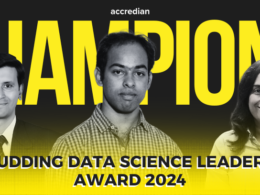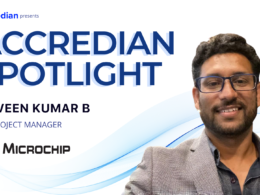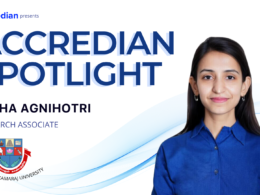At Accredian, we create accomplished and empowered Data Leaders. We groom our students to dominate the world of Data Science and Artificial Intelligence and reshape their future. We value what our students bring to the table. We share their vision and support them during their journey and ensure that they carve a niche for themselves.
We’re proud to have tutored exceptional students all across India. Today, one such exceptional student, Lalit Joshi stands in the spotlight.
Student Name: Lalit Mohan Joshi
Batch: GCD – January 2019
Total years of experience: 4 years
Area of expertise: Technical Support Engineering
Malvika: Can you start by telling me something about your professional journey so far?
Lalit: I started my career at Genpact in a semi-technical profile then I move to Dell, where I provided hardware and software assistance to Dell customers. After leaving my job at Dell, I started looking for different career perspectives. At that time, I started learning a little bit about R and Data Science.
I then joined Convergys as a Support Specialist for Microsoft EPS, that’s Enterprise Platform Support, where we provide support to Microsoft client, like NASA or SpaceX, and if they have any concerns related to the domain, like Active Directory, then we provide assistance to them. I’m also involved with one of my seniors who is associated with Microsoft, and we’re trying to implement a lot of machine learning models. We are trying to build one or two, but that still is in process. So mainly I’m working as a Support Engineer for Microsoft.
Malvika: So what got you interested in Data Science and artificial intelligence in the first place?
Lalit: I have a B.Tech degree in electrical engineering. So how it started was when I was in Dell, I realized there was a huge gap in what I wanted, where I started, and what I had studied. That’s when I thought of other career alternatives, I researched about opportunities in development and switches into supply chain management. That’s when I started reading a lot, and the material online is very generous.
I remember reading an article titled ‘Can machines beat human?’ It was about how machine learning is changing the whole perspective of how human beings handle tasks and how machines will behave in the future. And from that point onward, I started reading a lot about us; it took me approximately one year to actually get myself up and apply my energy to machine learning.
Malvika: What do you think is the goal of Data Science? And how do you think Data Science has evolved over the years?
Lalit: I’d say the goal of Data Science is not generic but it depends on people who are deploying it. It’s different from person to person. A part of the population wants to automate everything; have human robots who can do everything. These people are mostly into research.
Then there are many people who want to limit Data Science to a certain extent. They want a fully functional machine to take decisions, which for a human would take a lot of time. That will happen, because the amount of processes we are adding now like the GPUs, will make all of this possible in the next 10 years.
Malvika: What are some current applications in this space that you’re excited about?
Lalit: Google maps have a rich application of machine learning and Data Science. I get surprised when I’m traveling to places which 4-5 years back, would be impossible to find. Now you just enter the location, you will find each and every nook and corner of every city mapped in Google Maps. Another application is recommendation engines. I have mixed feelings about them.
Sometimes, especially on YouTube, once you start viewing a particular video, you will get recommendations of the like, but you might want to change that. Right? But again, the recommendation engines for Google and Amazon are really good. Another application that I really like is auto-correction or auto-completion. Many of our customers are actually not based in the US but in the EMEA time-zone, like China or Japan where English is not their native language. So they send emails to us in their own native language. The best thing I liked about Google language converter is you type anything, and then you will get an output in English and that that makes the conversation easy for us and for them as well.
Malvika: What were some initial challenges that you faced when you started in this space? And based on that, do you have any advice for a newbie, who’s going to start a career in Data Science?
Lalit: It’s really easy to start. It happened to me with Python and R. Initial beginner courses are easy to start and handle but once when you start going deeper and deeper, more in detail on how to actually implement it, then it takes your sweat and spirit. When you explore concepts on a medium or advanced level, then it gets complicated.
People actually leave at that point, it makes things more difficult and they already have a job where they’re currently satisfied. My advice for them is to join a course, take assistance from someone who is actually trained on that, that will help you to excel. Discarding the future goal because the current way of learning has gotten tough is never the solution.
Malvika: Are there any blogs about Data Science and Artificial Intelligence that you follow? Or any Data Scientist or influencers that you look up to and you follow?
Lalit: I actually like to read a lot but unfortunately I don’t always have the time. I follow blogs on Medium; they share solid concepts. I also follow Andrew Ng. His videos on YouTube are informative and engaging. I remember the first video I watched when he was teaching at Stanford University. It’s a big series of around 21 parts. As a novice, I didn’t understand every single thing there but it was still riveting because of his way of teaching. My shift has happened to videos since they’re time-saving and more impactful.
Malvika: What are some machine learning algorithms or Python packages and libraries that you like to work with?
Lalit: People start by learning a lot of Numpy and numerical packages but we don’t use it that much apart from initial mathematical analysis. So the best libraries like Numpy and Pandas are used extensively in EDA. I would like to explore that area first.
Secondly, random forest and decision trees are the algorithms that I’m more focused on using. We have so far covered supervised learning; logistic regression and random forests are the algorithms here that I liked the most.
Malvika: Accredian’s mission is to groom Data Leaders of tomorrow. What do you understand by a Data Leader? And how is a Data leader different from a Data Scientist? Lalit: If you’re given a task and you’re just performing it, you’re a typical professional. In the Data Science aspect, you’re an average Data Scientist but if you’re taking a team with you; you are helping other people as well or being a role model for your colleagues, you’re a Data Leader. Let me give you an example, I’m a Subject Matter Expert in Windows Management instrumentation, it’s a service from Microsoft which is one of the toughest topics which people can think of in terms of how it is framed, and how it actually works. The workspace needs someone who can be trained on it, and train other people. So I took that task. My technical lead and I framed a big presentation for people who do not have any idea on how it works. So in simple terms, a leader needs to take initiative, Firstly, he needs to be aware of himself, then make other people aware. I think Accredian is doing exactly the same thing where you are making people capable of training. That’s what I like about this program and that’s why I’m associated with it. Malvika: That’s an amazing feedback. My last question for you would be how do you think Accredian has helped you in your Data Science journey so far? Lalit: When I joined Accredian, I had a basic knowledge of R and Data Science. I was looking for some guidance that could make me go to the next level in this process. So I actually researched a lot of different solutions and joined some demo classes. What I really liked about Suchit was he was not interested in spoon-feeding. He asked why don’t you check yourself? I admired this approach. You give the opportunity to people and students to actually go out and search for themselves; to become better researchers. If I needed to tutor someone tomorrow, I’ll apply the same approach. I’ll make students more self-dependent than being dependent on me.
Malvika: We’re glad to hear that. Thank you for your time, Lalit. All the best for your future.
Lalit: Thanks a lot, Malvika. Bye!





